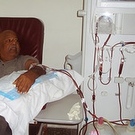
“For as long as I can remember, I have been a builder, a fixer, an explorer,” said myeloma patient Scott Woodward in a speech at an event benefitting Gilda’s Club, a cancer support group. “You’d want me along if you ever got shipwrecked.”
After a boyhood fixing motorcycles and rider lawnmowers, Woodward is now a New York-based mechanical engineer who researches the fluid dynamics of blood. He has lived with multiple myeloma since his diagnosis just after Christmas in …
Read the full story »

Even though doctors sometimes skip bone marrow exams during clinical trials, a Mayo Clinic study discovered that they are crucial after experimental multiple myeloma treatments. Other standard tests for multiple myeloma patients’ responses to treatments can give false positives if used alone. The study was published in the journal Blood in late July.
Whether the study’s findings will apply to patients not in clinical trials is up for debate. However, the findings are very important to doctors doing clinical trials …
Read the full story »

Phase 2 trials will begin for a new form of melphalan (Alkeran), a form of low-dose chemotherapy for multiple myeloma patients, made by CyDex Pharmaceuticals, Inc. These studies will compare the effectiveness of CyDex’s new melphalan, Propylene Glycol-Free Melphalan HCL (CDX-353), and GlaxoSmithKline’s Alkeran in multiple myeloma patients who will be undergoing stem cell transplants.
According to CyDex’s press release, the advantages of the new treatment are its one-vial packaging, gentler formula, and increased stability at room temperature. “These …
Read the full story »

Close relatives of people with multiple myeloma or monoclonal gammopathy of undetermined significance (MGUS) have an increased risk of having MGUS, according to research published in the journal Blood on Thursday. The research found that parents, siblings, and children of people with multiple myeloma or MGUS are 2.6 times more likely to have MGUS than the general population. An MGUS diagnosis is associated with an increased risk of developing multiple myeloma.
Scientists at the Mayo Clinic looked at blood serum …
Read the full story »

For those with multiple myeloma, kidney impairment treatments may become a significant part of their myeloma treatment, affecting their daily lives. These treatments require an amount of time and care that may impact patients’ daily schedules and long-term plans.
Wherever a patient goes for treatment, the health care providers there will make sure his fluid intake is right for his condition. Often, patients will have to stay in a hospital overnight to be monitored and to receive other treatments, which …
Read the full story »

Vegetarians have a 45 percent lower risk of being diagnosed with cancers of the blood, including multiple myeloma and non-Hodgkin’s lymphoma, according to research published in the British Journal of Cancer last Wednesday.
More specifically, the study found that there was a difference of 75 percent relative risk between vegetarians and meat eaters for developing multiple myeloma.
For this research, scientists at the University of Oxford compared vegetarians’ and meat eaters’ risks of developing cancer. This was done by analyzing …
Read the full story »

The American Cancer Society estimated that in 2009, 20,580 people in the United States will be diagnosed with multiple myeloma. The lifetime risk for developing multiple myeloma is 1 in 161, or 0.62 percent.
Although scientists and doctors do not know the exact causes of multiple myeloma, doctors do know some risk factors that make people more likely to develop multiple myeloma. However, many people who have more than one of these identified risk factors do not get the disease, …
Read the full story »
